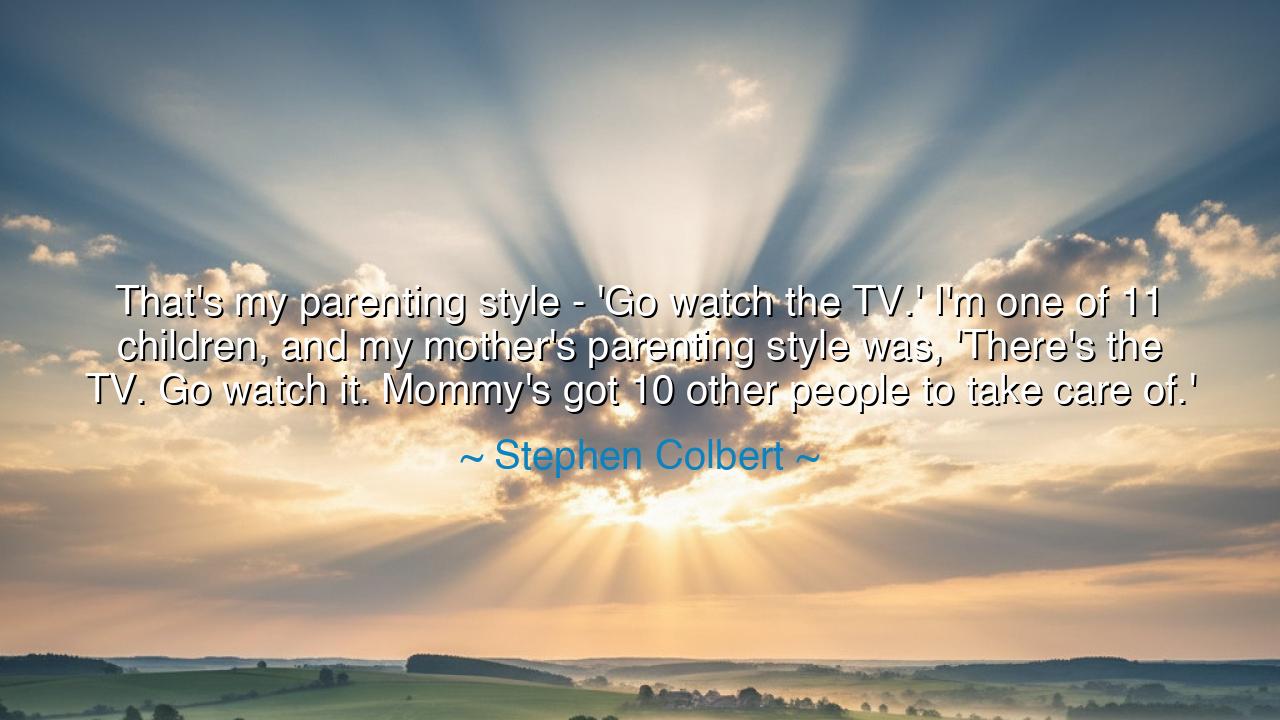
That's my parenting style - 'Go watch the TV.' I'm one of 11
That's my parenting style - 'Go watch the TV.' I'm one of 11 children, and my mother's parenting style was, 'There's the TV. Go watch it. Mommy's got 10 other people to take care of.'






Stephen Colbert’s words, though wrapped in jest, carry beneath them a truth ancient and enduring: “That’s my parenting style – ‘Go watch the TV.’ I’m one of 11 children, and my mother’s parenting style was, ‘There’s the TV. Go watch it. Mommy’s got 10 other people to take care of.’” At first, we hear only the humor, the laughter of a comedian recalling childhood chaos. Yet behind the laughter lies wisdom about the nature of parenting, about survival amidst abundance, and about the sacrifices of those who bear too many burdens for any one soul to hold.
For the ancients knew that when the household grew vast, the parent’s power to give undivided attention grew thin. A mother or father with one child may nurture like the gardener who tends a single vine, pruning with care, watering with patience. But a mother of eleven? She is no mere gardener—she is a farmer of fields vast and unruly, where the labor of the day demands triage. Some vines flourish from the warmth of her hand, others are left to the sun and rain. Colbert’s mother’s parenting style, pointing her children toward the TV while she turned to others, was not indifference—it was necessity, the strategy of one who bore a legion beneath her roof.
In the annals of history, such tales are not uncommon. Consider Catherine de’ Medici, mother of ten children, queen and regent of France. With so many heirs to guide, to protect, to marry into alliances, she could not pour herself wholly into one. Instead, she gave fragments of herself, enough to ensure survival and position, while the rest was left to chance and circumstance. Not every child thrived, and yet from this vast brood emerged monarchs who altered the destiny of nations. Her story, like Colbert’s mother’s, reminds us that sometimes parenting in multitudes is less about perfection than about endurance.
Colbert’s words also reveal the strange salvation of distraction. In ancient villages, children were sent to the fields, to the herds, to the older siblings, so the mother’s hands might be free. In the modern age, the glowing screen became the village elder, holding the attention of restless youth while parents labored in silence or exhaustion. Though mocked, this was a tool of survival. It was not always the ideal form of nurture, but it provided breathing space, a pause in the storm of endless need. Even such imperfect strategies testify to the ingenuity of parents under pressure.
Yet there is another lesson here: love is not always measured by constant presence, but by sacrifice unseen. Colbert’s mother, raising eleven children, could not embody the delicate, attentive ideal of modern parenting manuals. Yet in her sheer survival, in her endurance, she gave her children the chance to live, to grow, to become. And perhaps, in the laughter of her son recalling her words, we hear not resentment, but gratitude—that in her imperfection, she still gave enough.
The wisdom we inherit from this tale is thus twofold. First, let us cast off the illusion of perfect parenting. To raise children is not to sculpt marble with flawless strokes, but to manage chaos with courage, humor, and the tools at hand. Second, let us honor those who carried heavy burdens, who may have seemed distracted or overwhelmed, yet who gave what strength they had. For often, the children of such homes emerge with resilience, creativity, and humor that becomes their strength in the world.
Practically, this means parents should temper their guilt with compassion for themselves. If you cannot give every moment, every lesson, every tender word, know that your effort still matters. Balance structure with freedom, discipline with laughter, guidance with independence. And if the television or its modern equivalent must sometimes stand in as helper, do not despair—it is not the end of love, but a sign of your human limits.
So let Stephen Colbert’s jest be remembered not only for its humor, but for its hidden truth: parenting is not a pursuit of flawless performance, but of endurance, love, and survival amidst the impossible. In the chaos of large families, in the juggling of countless needs, even small acts of care are seeds that one day blossom into gratitude, resilience, and stories told with laughter across generations.






AAdministratorAdministrator
Welcome, honored guests. Please leave a comment, we will respond soon